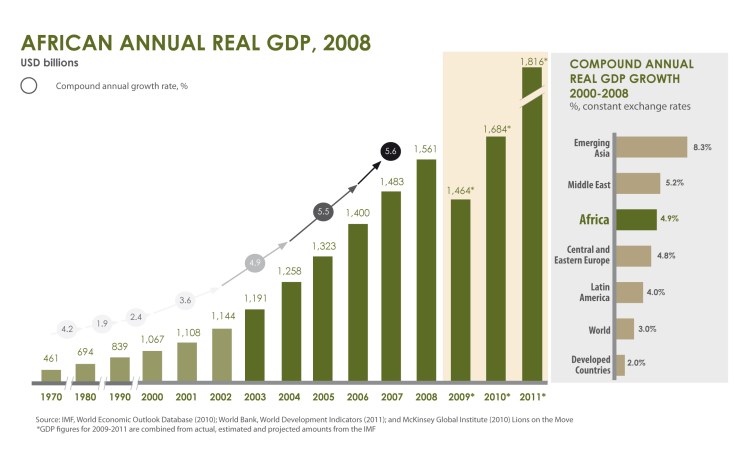Cape Town — The global financial crisis is set to drive millions more people into poverty, to slash radically capital flows to Africa and to deprive sub-Saharan Africa of at least U.S. $50 billion in income by the end of this year, predicts a new report released on Wednesday.
The report, published at the meeting of the World Economic Forum on Africa in Cape Town, was drawn up by an international review panel established to monitor whether the world's leaders are meeting their commitments to Africa. The group, known as the Africa Progress Panel, is headed by former United Nations secretary-general Kofi Annan.
The panel said many African nations had worked hard to establish macroeconomic stability and pursue sound economic policies over the last year. Even as economic turbulence began to cut the demand for exports in the second half of 2008, many countries managed to achieve high rates of growth in per capita income, and investment continued to flow into the continent.
"However, since early 2009, capital inflows have come under growing pressure as global liquidity tightened, exchange rates and capital markets became more volatile," the panel said. "And investors have become more concerned about an increase in political and macroeconomic risks and the liquidity of their assets."
Summarizing forecasts which it said "paint an increasingly gloomy picture," the panel noted that:
- The International Monetary Fund (IMF) has reduced its growth forecast for sub-Saharan Africa from 5.5 percent in 2008 to to 1.7 percent this year;
- The IMF is predicting that a continued decline in economic activity could result in more than 53 million people being added to those living on less than $2 a day;
- The Institute of International Finance predicts an 82 percent decline of net capital flows to developing countries, from $929 billion to $165 billion, with Africa expected to suffer particularly badly;
- The World Bank estimates that by the end of 2009, sub-Saharan Africa nations will have lost expected incomes of at least $50 billion; and
- The bank is warning that 43 of Africa's 53 states are highly exposed and vulnerable to the effects of the global crisis.
Introducing the report, Annan said that at a time when other flows of finance into Africa were dropping, aid played an even more important role than it had previously. "Aid, effectively used, can leverage other financial flows, strengthen capacities and meet urgent social and humanitarian needs," he wrote.
The world's economic powerhouses represented in the Group of Eight, and other donor countries, now had "an even greater responsibility to honour their international aid commitments and to ensure that global deals, whether on trade, climate change, intellectual property, illicit drugs, crime or migration, are supportive of Africa's development needs," Annan added.
Nevertheless, he said, "primary responsibility for Africa's progress rests with her political leaders." They had to articulate and assert Africa's needs and agenda on the global stage: "The success stories show that the quality of people's lives, the opportunities available to them, and their economic security can be rapidly improved with the right combination of leadership, resources and accountability. The problem is that these successes are not being replicated enough or taken to scale
"The primary responsibility of leaders is to set and drive a national development agenda that is responsive to peoples' needs and aspirations, and for which leaders are then accountable. The quality of dialogue between citizens and their leaders is a critical condition for progress and also the best form of managing tensions, and therefore of conflict prevention."
Annan said the accountability of leaders to their people was a deeply-rooted African tradition. "But in many parts of the continent, it is frayed. There are too many instances of elite capture of resources, growing inequality in wealth and opportunity, and the abuse of electoral processes to legitimize exclusive deals among the most powerful."
The panel said the report's gloomy figures were "more than mere statistics. Every percentage fall in growth means a reduction in budget allocations for public services and reduced household incomes, with immediate social impacts - for example on nutrition levels, infant mortality and school attendance.
"Every person pushed back into poverty means another step away from achieving the Millennium Development Goals. Hard won gains in poverty alleviation, health, education and food security are now at risk of being reversed."
The panel predicted that poor countries which depend most on trade for income would be hit hard by the global economic meltdown. "Countries like Lesotho, Swaziland and Cote d'Ivoire will not only find it difficult to maintain basic services like healthcare and education, but will also struggle to contain the resultant increase in social unrest and political instability."
Exporters of commodities such as oil and metal, such as Zambia - a copper exporter - would be hit hardest by falling commodity prices.
Remittances sent home by Africans working in materially rich countries were expected to drop by eight percent. And while aid flows to sub-Saharan Africa had increased, the fluctuation of currency exchange rates alone could cut direct assistance by as much as $5 billion.
Apart from Annan, the panel's members include the former Nigerian president, Olusegun Obasanjo, activist Graça Machel, Botswana's central banker, Linah Kelebogile Mohohlo, former Ivorien minister and business leader Tidjane Thiam, the former British prime minister, Tony Blair, musician Bob Geldof, former IMF managing director Michel Camdessus and former United States treasury secretary Robert Rubin.
Read the panel's findings and recommendations >>
Climate Change Threatens Instability in 37 Nations, Says Report


